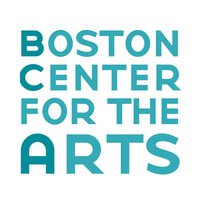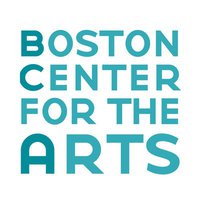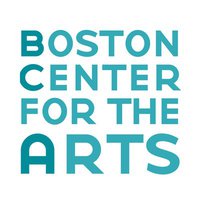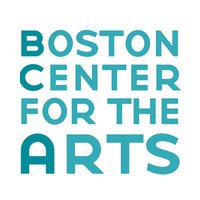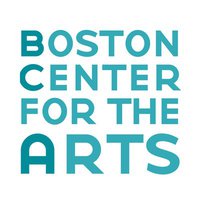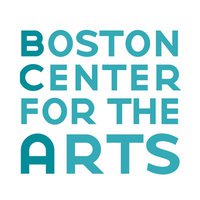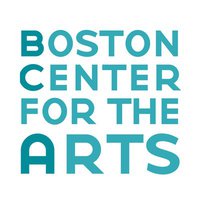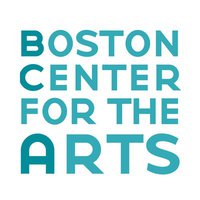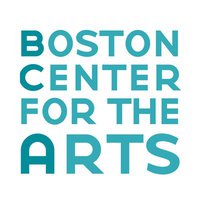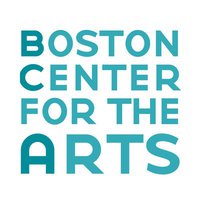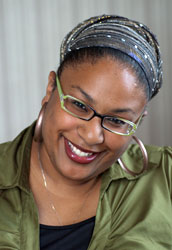 JACQUELINE LAWTON: Why did you decide to get into theatre? Was there someone or a particular show that inspired you? HANA SHARIF: One of my earliest theatrical memories was seeing Porgy & Bess at the outdoor theatre with my parents. I was maybe six years old. I still have such clear memories of the costumes, the music, and feeling of sitting on the blanket with a picnic basket and feeling joy. There are many defining productions in my childhood and youth that inspired me A Soldier's Story, Long Days Journey Into Night, Funnyhouse of a Negro, Noise / Funk to name a few. But ultimately, I fell hopelessly in love with beautiful intimacy and infinite possibility found when rich stories, fearless artists, and a willing audience collide. JL: Where do you feel we are in terms of gender and race in larger landscape of the American Theatre? HS: It depends on how you contextualize it. The American Theatre has never been more diverse in terms of the balance of art and artists being produced. That being said, the balance of power is far from equitable. It would not be unreasonable to look at a snapshot of the field and take away the idea that it is a very monolithic community. I think the larger question is how do we dynamically shift the way we think about the art we produce in a way that opens the door to a larger range of artists. JL: How do you feel your community has addressed the issues of race and gender parity? How has this particular issue impacted you and your ability to practice your craft? HS: I am new to Boston, but I have been impressed by the number of female directors, producers, theatre service organization leaders and multifaceted artists that are at the forefront of the Boston Theatre Scene. I am fortunate to have a range of mentors, advocates and angels that have taken great leaps of faith in support of my craft. Most of my career has been spent walking into rooms where I am the "only" - Only African American, or female, or both in the room. I realized early on how important it is to have a support system and reached out to others around the country that are sharing the experience of trying to produce, direct, or write in room where no one else looks like you. Some of my most valuable collaborators, mentors, and friendships have been found by reaching out a hand to say "I am here and this is my experience. How has it been for you?" JL: Why is it important that we continue to have these conversations that address gender and race in theatre? HS: There is no future without progress, no progress without change, no change without discourse. The theatre is an inherently transformative space. Every time we challenge ourselves to further clarify and define the challenges of racial and gender disparity, we become the architects of world large enough to hold all of our stories. JL: What excites you about taking part in the XX Playlab Festival? HS: I am exciting by the level of discourse XX Playlab team is committed to nurturing and the incredibly talented playwrights featured this year!
0 Comments
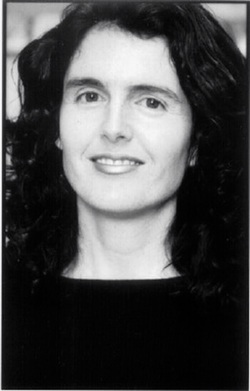 JACQUELINE LAWTON: Why did you decide to get into theatre? Was there someone or a particular show that inspired you? ANNE GARCIA-ROMERO: My Spanish father’s immediate family members were all performers. My grandparents were singers in Compañia Santa Cruz, a zarzuela troupe (Spanish light opera) that toured throughout Latin America, Central America and Cuba in the early decades of the twentieth century. The troupe included the mother of Plácido Domingo. My eldest aunt, Ana María Olaria, was a renowned zarzuela and opera singer in Spain in the 1950’s and 60’s and my uncle, Tito Mora, was a successful popular singer in Spain in the 1960’s and 1970’s. While I grew up in the Boston area, my Spanish family would visit us and we’d also spend time with them in Madrid. I was very taken by their theatrical lives. Also significantly, my American mother was a professor of Spanish literature at Pine Manor College in Brookline, MA and for the first seven years of my life, we lived on campus. From a very young age, I began accompanying my parents to the musical theater productions in the college’s impressive performing arts center. Even after we moved to nearby Wellesley, MA, I continued to see the shows at Pine Manor every year and was completely enthralled. Once, when my abuela (grandmother in Spanish) was visiting us from Madrid, we attended a musical together. Afterward, she proclaimed, “A Ani le encanta el teatro mas que nadie en nuestra familia." (Annie loves the theater more than anyone in our family.) I’ll also never forget sitting in the balcony of a Boston theater seeing Richard Kiley starring in the national tour of Man of La Mancha. I’d seen the TV ads about the show and begged my parents to take me. One of my childhood friends asked me, “Why would you want to see that?” and in my emphatic eleven year old voice, I exclaimed, “It’s my heritage!” I continue to explore and honor my heritage, my culture and my family in the plays that I write. JL: Where do you feel we are in terms of gender and race in larger landscape of the American Theatre? AGR: I feel we need to continue to address the complexities of gender and race in the American Theatre. Our 21st century society is ever more culturally diverse. The American Theatre needs to continue to embrace the multivaried ways in which race and gender present themselves in our contemporary age. Specifically, I'm currently part of a new initiative, Latino Theater Commons, a national advocacy group, that aims to connect Latino/a theater artists across the country and raise awareness of contemporary Latino/a theater in this country. In describing our aims, we focus on the need to update the U.S. narrative in American Theatre. I wrote a short article about Latino Theater Commons for Howlround.com. I share an excerpt here as I feel it also very much applies to the conversation of race and gender: “Theater can function as a reflection of our contemporary national narrative. The character journeys on a stage often help us better understand the complexities of our society. US culture in the twenty-first century continues to move from a mono-cultural to a multi-cultural experience. However, US theater currently does not always reflect this reality and therefore can perpetuate an outdated narrative. Contemporary Latino/a theater updates the US narrative through presenting diverse cultural worlds that allow theater audiences to more fully understand the US experience in the twenty-first century.” * JL: How do you feel your community has addressed the issues of race and gender parity? How has this particular issue impacted you and your ability to practice your craft? AGR: One way I feel this issue has impacted me and my craft is that, in addition to being a playwright, I'm also a theater studies scholar and have spent the last several years writing a book, Contemporary Latina Theater: Transcultural Voices, which explores the work of five award winning Latina playwrights: Cusi Cram, Quiara Alegría Hudes, Elaine Romero, Caridad Svich and Karen Zacarías and how they address culture, identity, spirituality and theatrical experimentation in their work. I felt compelled to research and write this book as these vibrant women exemplify the transcultural complexity of the twenty-first century Latina community and their work, on the whole, has not been included in Theater Studies scholarship. JL: Why is it important that we continue to have these conversations that address gender and race in theatre? AGR: I feel it is important that we continue these conversations as they raise awareness regarding these essential issues of race and gender. We need to consistently engage in a dialogue in which we share our experience, expertise and craft, and thus broaden the knowledge base about the remarkable work being generated by women of color in the American Theater. JL: What excites you about taking part in the XX Playlab Festival? AGR: I'm excited and encouraged to take part in a festival that celebrates women and diverse voices. I grew up near Boston and those formative years hugely influenced my path in the theater. Now, I'm currently based in the Chicago area so I feel honored to return to Boston to be part of this compelling conversation.
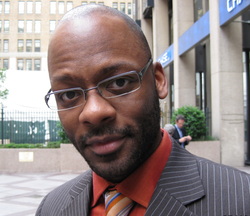 JACQUELINE LAWTON: Why did you decide to get into theatre? Was there someone or a particular show that inspired you? OTIS CORTEZ RAMSEY-ZOE: I wish that this were a more thrilling story. I wish that I could say (as I sometimes do say when I’m in a revisionist mood) that I had encountered the work of Federico Garcia Lorca, Bertolt Brecht, or Tennessee Williams, and that one or all three led me to the theatre. The honest, boring story is that I did a Christmas play when I was in the second grade. I forget the play, but in the story on Christmas Eve all of the toys come to life. I played a duck, and to this day I remember my big line. I’ll spare you the setup and go directly for the punch. The toy soldier says, “Halt, who goes there?” And I respond, “Quack! Quack! You scared the feathers off my back!” Years later as a first-year student at the University of Notre Dame, I glided into the theatre department office and declared my intent to major in theatre. At that point, I had never taken a single drama class. There’s one other story pertaining to the meaning of my name, but I save that one for face-to-face encounters. JL: Where do you feel we are in terms of gender and race in larger landscape of the American Theatre? OCRZ: I think that American theatre is a reflection of American society, values, and ideas. Theatre is not created, produced nor presented in a vacuum, and since theatre is representational it reproduces society’s glories as well as shortcomings and failures. We are where we are, although it is not where we are supposed to be. It is our job to push inside and outside of the theater space and to make theatre that pushes people’s buttons and inspires thoughtful interrogation and change. I include change of hearts and minds in my call. JL: How do you feel your community has addressed the issues of race and gender parity? How has this particular issue impacted you and your ability to practice your craft? OCRZ: This question is slippery—I can’t pin it down like a butterfly. The first trap that catches me is the demarcation “your community.” I don’t mean trap pejoratively; I’m thinking specifically about an enclosure, but I welcome the myriad evocations. In America, we do this thing where we make neat enclosures or categories. We break things apart, and we say “your community” and “their issue” and “how do they solve it.” I am the only member of “my community.” Miles Davis once said, “If you understood everything I said, you’d be me.” Moreover, because I don’t function in one single community, I am also communities. We have to consider that a community is simultaneously:
(Disclaimer: These three short definitions occurred to me instantly, but I am certain that there are other ways of thinking about the term.) I feel a need to continue to interview the term community in addition to the concept of boundaries. As such, I don’t have an answer, but I plan to continue to wrestle with the question. In terms of impact on my ability to practice my craft, hundreds of answers fill my mind. The truest response for me is that it doesn’t. I am able to practice my craft because I am the governor of actions. America’s race and gender issues do not define me (for me) even if they provide a frame for other’s interactions with me. Similarly, the theater’s issues have an impact on opportunities, which are external, and when I say that it doesn’t impact me, I’m referring to internal and personal choices. Of course, this is only a partial response to a complex question. JL: Why is it important that we continue to have these conversations that address gender and race in theatre? OCRZ: I believe that the conversations are essential insofar as they inspire action and provide information that helps people to see what action steps should be taken. Action is what gives these conversations meaning. Without action perhaps we are just a collection of people making word music, in which case we needn’t structure our sentences in complete thoughts since it would be wholly sufficient to arrange words according to sound to create sound scores. JL: What excites you about taking part in the XX Playlab Festival? OCRZ: I am most excited about the lineup of artists, hands down!! Company One and BCA have assembled a remarkable collection of minds. I anticipate being enriched by the fellowship with the artist-scholars. I live to listen; in fact, it’s how I found my career. I am excited about listening to everyone.
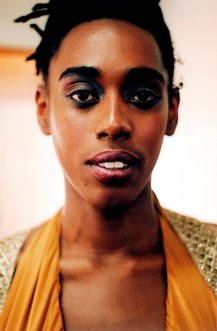 JACQUELINE LAWTON: Why did you decide to get into theatre? Was there someone or a particular show that inspired you? LENELLE MOISE: I was an immigrant daughter from a religious and over-protective household. I wasn’t allowed to play outdoors. I became a very bookish and serious child. Studying and creating theatre gave me much-needed opportunities to play. In rehearsal studios, black boxes and larger theaters, I learned social skills and confidence. My working class parents couldn’t afford athletic gear or musical instruments. Pencils, paper and imagination are affordable. JL: Where do you feel we are in terms of gender and race in larger landscape of the American Theatre? LM: I find that American audiences are eager—or, at least, curious—to see women and people of color in complex, leading roles. Producers and presenters are starting to catch up. JL: How do you feel your community has addressed the issues of race and gender parity? How has this particular issue impacted you and your ability to practice your craft? LM: I feel very empowered and encouraged as a performance poet and solo theatre artist to create work that is both artistically strong and sociopolitically relevant. In academia, my work is examined for both its craft and its politicized content. As a playwright, I’m still looking for ways to have anti-racist and feminist conversations in the theater with a sense of collective responsibility and enthusiasm. We need to move beyond fear, guilt and silence into a space of inquiry, truth-telling, respect and joy. Theatre people are equipped to build sparkly safer spaces for these kinds of conversations. We have talent, flexibility and comic timing. If we can’t do it, who will? JL: Why is it important that we continue to have these conversations that address gender and race in theatre? LM: In her play, The Butterfly Collection, Theresa Rebeck writes, “Don’t you think it should be considered a limitation if you can’t imagine what it means to be human for half of the human race?” Humans have gender and race! Yes, even men who are white. Conversations like this affirm and celebrate a wider range of human experience. Conversations like this can be limitless. JL: What excites you about taking part in the XX Playlab Festival? LM: It’s inspiring to see and discuss work by New England-based women of color playwrights. Their stories and philosophies tell me about the time, space and culture I’m living in. Theatre artists are compasses! We need them to know where we are.
XX PlayLab Festival - Where We Stand: Race and Gender in the New Play Sector Round Table Discussion3/22/2013  I'm heading to Boston! It’s my first trip back since the TCG Conference this past June. I’m leaving Gettysburg completely charmed by this town (and its ghost) and appreciative of the faculty, staff and students at Gettysburg College. The workshop and reading of Our Man Beverly Snow as part of Gettysburg College's New Play Festival was amazing, nurturing and productive. After such a wonderful experience, I’m so excited to be taking part in the readings and panel presentations at Boston Center for the Arts and Company One’s XX PlayLab Festival. On Saturday, March 23rd at 10:00am, dramaturgs Ilana M. Brownstein and Tyler Monroe will host a conversation with Lydia R. Diamond (playwright), Kirsten Greenidge (playwright), Natalia Naman (playwright), Shawn LaCount (director), Megan Sandberg-Zakian (director), and Charles Haugland (dramaturg) about the life and career of the XX Playwright in Boston. Then, on Sunday, March 24th at 12:00pm, I'll be taking part in a round table discussion, Where We Stand: Gender and Race in the New Play Sector. This will be a national conversation with industry professionals Anne Garcia-Romero, Hana Sharif, Otis Ramsey-Zöe, Lenelle Moïse and me. This conversation about Gender and Race has a large part to do with why I started writing plays. In high school and college, it became painfully obvious that plays with roles for women of color would be few and far between. Instead of complaining about it and with the help of my mentors, Amparo Garcia Crow, Jill Dolan, Ruth Margraff, and Omi Olono Osun, I started writing plays. I endeavored to write rich, dynamic and exciting roles for women and people of color. I was young, but I was purposeful steadfast in this decision. In D.C., the energy around race and gender parity in the American Theatre and especially in the new play sector is loud, demanding and explosive. Shifts in race/gender consciousness are happening in an important, but uneven way. Quite simply, not everyone is getting on board at the same the time. As seasons are announced, it’s fascinating to see how this awareness or lack of awareness plays out in conversations that are being had on our stages. I strongly believe that race, gender, and even class parity are essential to the American Theatre. Until we get to a place where artistic leadership, administrative/educational staff, cast/production teams and artistic programming truly reflect our communities, it’s imperative that those who are passionate about such issues speak, dance, sing and shout about these issues. These efforts are essential not only for theatre artists creating the work, but for our audiences who come to theatre to see the human experience explored on stage. What excited me about taking part in the XX Playlab Festival, was the opportunity to see great plays by women of color and to engage in a conversation about race and gender parity in the American Theatre. I'm particularly interested to see where the D.C. Theatre community stands in relation to other theatres communities across the country. If you're not in Boston, but would like to participate in the conversation, you can do so through #NewPlayTV! I had a chance to connect with the smart, talented and passionate artists convening for the Where We Stand: Gender and Race in the New Play Sector roundtable discussion and will share those interviews with you shortly. For now, here's a little bit about each of us. Please enjoy! 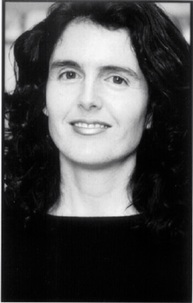 ANNE GARCIA-ROMERO Anne Garcia-Romero's plays include PROVENANCE (Eugene O'Neill National Playwrights Conference); PALOMA; EARTHQUAKE CHICA; MARY PEABODY IN CUBA; LAND OF BENJAMIN FRANKLIN; HORSEY GIRL; DON QUIXOTE DE LA MINNY; MARTA'S MAGNIFICENT MUNDO; DESERT LONGING; JUANITA'S STATUE; and SANTA CONCEPCION. Her plays have been developed and produced at the New York Shakespeare Festival/Public Theater, Summer Play Festival (Off-Broadway), Mark Taper Forum, Hartford Stage, South Coast Rep, O'Neill National Playwrights Conference, INTAR, HERE, New Georges, Borderlands Theater, Nevada Rep, Jungle Theater, East L.A. Repertory, National Hispanic Cultural Center, Open Fist Theater Company, Wordbridge Playwrights Laboratory, and LoNyLa Writers Lab. She's received commissions from the NYSF/Public Theater, The Taper and South Coast Rep. She's been a Jerome Fellow at the Playwrights Center of Minneapolis as well as a MacDowell Colony fellow. Ms. Garc’a-Romero has written for Peninsula Films, Elysian Films and Disney Creative Entertainment. She is the U.S. translator for the internationally acclaimed THE GRONOLM METHOD by Spanish playwright, Jordi Galceran. Her plays are published by Broadway Play Publishing, Playscripts and NoPassport Press. She's taught at numerous colleges, and is currently an Assistant Professor at Notre Dame. She holds an MFA in Playwriting from the Yale School of Drama, is an alumna of New Dramatists, and is a Resident Playwright at Chicago Dramatists. 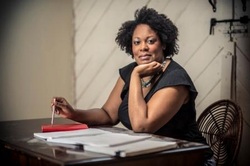 JACQUELINE E. LAWTON Jacqueline E. Lawton received her MFA in Playwriting from the University of Texas at Austin, where she was a James A. Michener Fellow. She participated in the Kennedy Center's Playwright's Intensive (2002) and World Interplay (2003). Her plays include ANNA K; BLOOD-BOUND AND TONGUE-TIED; DEEP BELLY BEAUTIFUL; THE DEVIL'S SWEET WATER; THE HAMPTON YEARS; IRA ALDRIDGE: THE AFRICAN ROSCIUS; LIONS OF INDUSTRY, MOTHERS OF INVENTION; LOVE BROTHERS SERENADE; MAD BREED; and OUR MAN BEVERLY SNOW. She has received commissions from Active Cultures Theater, Discovery Theater, National Portrait Gallery, National Museum of American History, Round House Theatre and Theater J. CINDER BLOCKS was published in EXPERIMENTS IN A JAZZ AESTHETIC: ART, ACTIVISM, ACADEMIA AND THE AUSTIN PROJECT (University of Texas Press). A 2012 TCG Young Leaders of Color, she has been nominated for the Wendy Wasserstein Prize and a PONY Fellowship from the Lark New Play Development Center. Lawton resides in D.C. and is a member of Arena Stage's Playwrights' Arena. 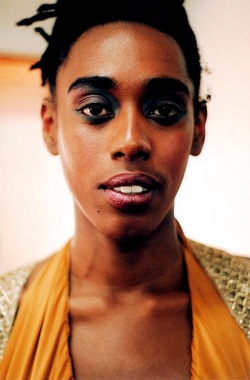 LENELLE MOISE Lenelle Moïse is a current Huntington Theatre Company Playwriting Fellow. She won the 2012 Southern Rep Ruby Prize for her comedy MERIT. She also wrote, composed, and co-starred in the critically acclaimed drama EXPATRIATE, which launched Off Broadway at the Culture Project in 2008. Her other plays include METAMORPHOSIS (Serious Play Theatre Ensemble); LITTLE GRIOT (The Drama Studio); PURPLE (Kitchen Theatre Company); CORNERED IN THE DARK (Insight Out Theatre Collective); and THE MANY FACES OF NIA. Her solo performances WOMB-WORDS, THIRSTING, and ACHE WHAT MAKE have been presented at colleges and theatres across the USA. Ms. Moise was a 2010 Hedgebrook Women Playwrights Festival Fellow, the 2010 recipient of the Astraea Lesbian Writers Fund Award in Poetry, the 2011 Artist in Residence in Performance Studies at Northwestern University, the 2012 Visiting Performing Artist in African & African Diaspora Studies at UT Austin, and the fifth Poet Laureate of Northampton, MA. www.lenellemoise.com 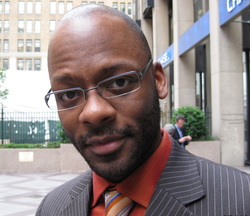 OTIS CORTEZ RAMSEY-ZOE Otis Cortez Ramsey Zoe is a Lecturer of Theatre Arts at Howard University,Future Classics Program Coordinator at The Classical Theatre of Harlem, Series Editor for NoPassport Press’s Dreaming the Americas Series, a freelance dramaturg, and a Company Member of banished? productions. He has developed new works with such organizations as The Sundance Institute, Kennedy Center, Arena Stage, Centerstage and Black Women Playwrights’ Group and by such writers as Colman Domingo, Tarell McCraney, Noah Haidle, Kirsten Greenidge and Tim Acito. He has directed readings including Jacqueline E. Lawton’s The Hampton Years and Blood-bound and Tongue-tied, James Webb’s The Contract and David Emerson Toney’s Kingdom. Previously, he was Literary Manager and First Look Coordinator at Centerstage and an Allen Lee Hughes Dramaturgy and Literary Senior Fellow at Arena Stage. Mr. Ramsey-Zöe holds degrees from New York University and the University of Notre Dame. 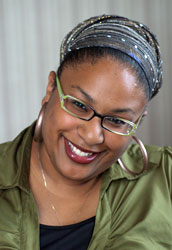 HANA SHARIF Hana Sharif has worked as a Director, Playwright, and Producer for fifteen years. She is currently Program Manager for ArtsEmerson's Ambassador Program, and for nine seasons, she was the Associate Artistic Director/Director of New Play Development, and Artistic Producer, at Hartford Stage. Hana also served as co-founder and Artistic Director of Nasir Productions, a theatre dedicated to bringing theatre to underserved communities. Her regional and international directing credits include: THE WHIPPING MAN; GEM OF THE OCEAN; GEE'S BEND; and NEXT STOP AFRICA. Hana has directed numerous developmental workshops including, most recently, Elyzabeth Gregory Wilder's THE CHAT AND CHEW SUPPER CLUB, and Marcus Gardley's THE HOUSE THAT WILL NOT STAND. Hana's plays include ALL THE WOMAN I USED TO BE; THE RISE AND FALL OF DAY; and THE SPROTT CYCLE TRILOGY. Hana is the recipient of the 2009-2010 Aetna New Voices Fellowship for her work as a playwright and director as well as the Theatre Communications Group (TCG) New Generations fellowship. She received a B.A. from Spelman College and a M.F.A from the University of Houston.
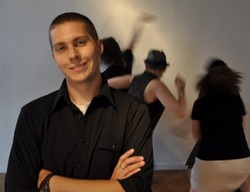 JACQUELINE LAWTON: Why did you decide to get into theatre? Was there someone or a particular show that inspired you? TYLER MONROE: Like most people, I came to theatre through acting-- and was primarily a performer for the better part of two decades. As a child, I wanted to be a movie star, so my mother carted me to a community theater audition on the same night as my local Boys and Girls club basketball tryouts. So while there were no shows that inspired me to pursue theater, I still owe an immense debt of gratitude to my mother for her support. However... if I had gone the other way that night, I might be playing point guard for the Indiana Pacers right now.... JL: How long have you lived and worked as a dramaturg in Boston? What brought you here? Why have you stayed? TM: I spent six years after undergrad working as a dramaturg and performer in Chicago before I decided to go back to school to get my MFA in dramaturgy. I ultimately decided to attend the ART/MXAT Institute for Advanced Theatre Training at Harvard University and moved out here for that. I spent a significant portion of my time during graduate school familiarizing myself with the Boston theatre community and after I graduated decided to stay. It was the small, though scrappy and self-possessed attitude that Boston theatre artists posessed that inspired me to stick around. This was just a shade under three years ago. JL: How do you define dramaturgy? Or explain it to people the work that you do? TM: I define the practice of dramaturgy as the laser-like focus on the conversation that occurs around theatre. Sure, the research, analysis, and textual support are all parts of it... but to me: It’s all about the discussion-- with artists, audiences, or with the play itself. I feel as if my job is to provide as many “entry points” into the world of the play for the people involved as possible. JL: What skills and traits do you feel a successful dramaturg should have to support the development of a new play or a production? TM: Above all, I think the ability to listen carefully to what a playwright is trying to say and asking questions to help them say this is of utmost importance. In my opinion, a dramaturg’s job is to assist the playwright in writing the play he or she wants to write-- not to offer fixes or solutions or “you should’s...”. So an inquisitive mind, a respect for the playwrights process, and a thick skin (because many times, your thoughts just aren’t going to be helpful to the playwright) are also important. JL: Now, I’d love to hear your thoughts about working in Boston. Finish this sentence ...
JL: How do you feel the Boston theatre community has addressed the issues of race and gender parity? How has this particular issue impacted you and your ability to get your work produced on the main stages? TM: For a city this size, I feel as if Boston does a fantastic job representing a multiplicity of voices on its stages-- especially at the fringe and mid-sized level. I still think this city has a ways to go before achieving true parity, but with programs like the XX Playlab, and the various companies who are shifting their programming, Boston is on the right track. JL: Tell us about the play you’re working on and what excites you about it. TM: Natalia Naman’s Old Ship of Zion [sorry, my computer wouldn’t allow italics] is a beautiful and sincere play that focuses on a church community in the south during a time of both internal and external crisis for its various members. What I love most about this play is Natalia’s wonderful faculty with language and the complete lack of irony in dealing with spirituality and the church. JL: Why should audiences attend the XX Playlab Festival? TM: Three readings of three stellar new plays by three immensely talented Boston area writers-- and with a host of exciting discussions to boot? Why shouldn’t audiences attend?
 JACQUELINE LAWTON: Why did you decide to get into theatre? Was there someone or a particular show that inspired you? ILANA M. BROWNSTEIN: I’ve always had a great love of story. I remember two incredibly visceral theatrical moments from my childhood. In the first, my parents took me to a storytelling event that I was, it turns out, much too young for. The storyteller was of some renown, and the place was packed. He told a scary folk tale about a forest monster and a starving woodsman, and I was so terrified I began screaming. The guy stopped the event and asked my parents if I was ok. We left before the story was over, which also upset me, since I wasn’t going to find out how it ended. The second event was when I was about 8. My mother was an English teacher at a private school, and took her class to see The Tempest at the Goodman’s old spaces; I tagged along. In this production, Ferdinand made his first entrance nude, and strapped to a wheel, after Leonardo’s Vitruvian Man. As he was rolled onto stage, the audience was incredibly, respectfully quiet. I, however, felt it was necessary for me lean over and inform my mother, very much too loudly, that this dude had no clothes on. So, the two earliest theatrical memories I have are essentially about me making a scene and disrupting the story. Maybe my life as a dramaturg, one utterly dedicated to story, has been some sort of atonement for that. JL: How long have you lived and worked as a dramaturg in Boston? What brought you here? Why have you stayed? IMB: I’ve been in Boston over 10 years now, and came here to be the Huntington’s Literary Manager and new play person. I never thought I’d stay, but Boston grew on me, and now it’s completely home. In 2003 I was wrestling with what it meant for a regional theatre to be truly regional – it was a path of inquiry that led me to create new pathways for local playwrights to intersect with the company. At that time, there were numerous Boston playwrights, but not much of a coherent community of writers. It’s a much different place these days. One of the things that has kept me here is my deep love of and commitment to the Boston theatre ecology, and to celebrating Boston playwrights here and abroad. JL: How do you define dramaturgy? Or explain it to people the work that you do? IMB: First, as you probably know, you ask 10 dramaturgs that question, you’ll get about 17 different answers. That said, here’s my basic definition, which I come back to over and over in my life. The dramaturg is the artist in the process whose job it is to uncover and present pathways into the world of the play for every imaginable constituency – be that the playwright, the characters, the staff of the theatre, the collaborators on the production, potential donors, audiences, or community stakeholders. JL: What skills and traits do you feel a successful dramaturg should have to support the development of a new play or a production? IMB: Grace, patience, persistence, being a close reader, great note-taking skills, even better human communication skills, empathy, and that peculiar brand of double vision that allows you to know the play intimately while cultivating the stance of the naïve observer. Also, it doesn’t hurt if you can provide snacks every once in a while. Or bourbon. JL: Now, I’d love to hear your thoughts about working in Boston. Finish this sentence...
JL: How do you feel the Boston theatre community has addressed the issues of race and gender parity? How has this particular issue impacted you and your ability to get your work produced on the main stages? IMB: I don’t think we’ve successfully addressed it yet as a whole, but there are a number of important initiatives underway that will begin to tell us, in terms of actual data points, who does and doesn’t access the theatre in this town, and why. StageSource and The Center for Theater Commons are both investing significant efforts on this front. My personal frustrations with these questions were a large part of why I came on board with Company One. It’s a place where we have these conversations constantly, and the questions of whose stories are (or aren’t) on Boston stages are formative for us in season planning. I would love to see more Boston playwrights actively take on these questions – there’s a hunger for local work that presents the multiethnic real world, rather than the “the bizarre, artificial world of all intact white people,” as Charles Mee so aptly puts it. JL: Tell us about the play you’re working on and what excites you about it. IMB: I’m working on both Splendor Lit Beneath Their Bones by Kirsten Greenidge, and Smart People by Lydia Diamond. Ah, these two plays, they are my heart. I have long-time collaborations with both playwrights, who are also teaching colleagues of mine, and dear friends. I love that I know their whole bodies of work; that these plays are in dialogue with plays in their back catalogues. I love that both are deeply local, and, I think, achieve universality through their specificity. Both playwrights have long relationships with Company One, and it feels extremely appropriate that they’d bring these scripts back to our artistic home. JL: Why should audiences attend the XX Playlab Festival? IMB: I have always believed in the power of demystifying the creation process. Plays do not (or at least, very rarely) arrive in the world fully formed and completed. They are living, breathing organisms that need the oxygen of actors and the light of an audience to come into their own. I think developmental play readings are exciting. You not only get to be in the room as the playwright does her work, but you are in dialogue with it. The act of being present changes the script, lets it find its legs. The XX PlayLab Festival allows audiences to get in on the ground floor with plays that are on their way to production, to be in conversation with the writers, and to see two incredibly hot roundtable conversations with leading artists and thinkers. Why wouldn’t you want to be there?
 JACQUELINE LAWTON: What was the first play that you ever directed? What did you learn from that experience that remains with you today? SUMMER L. WILLIAMS: My first professional show was JESUS HOPPED THE 'A' TRAIN. I loved and feared the thing at the same time because I thought I had to know all of the answers, had to have solved the puzzles of the play before we'd begun. I quickly learned that was totally wrong. JL: Why did you decide to get into theatre? Was there someone or a particular show that inspired you? SLW: I fell in love with theatre when I was 15. I went to a summer program at Freedom Theatre in Philadelphia and the late Wesley Montgomery was my instructor. He was fascinating, and spoke with such passion--I was awestruck. One day he pulled me aside and gave me a copy of SPELL #7 by Ntozake Shange. It was the first time I saw a real place for me in theatre. JL: What kind of work do you do to pay the bills? How do you balance this work with your work as a director? SLW: I teach theatre and direct at Brookline High. No idea how I balance it but my work at the high school offers me opportunities to flex different muscles. JL: Now, I’d love to hear your thoughts about working in Boston. Finish this sentence...
JL: How do you feel the Boston theatre community has addressed the issues of race and gender parity? How has this particular issue impacted you and your ability to get your work produced on the main stages? SLW: As a co-founder of Company One, I feel we are constantly investigating race and class. We are dedicated to creating opportunities for challenging dialogue with artists and audiences. IMHO, it feels as if the theatre community is hasn't fully entered the conversation especially as it pertains to audience development and institution infrastructure. In some ways I think as a black, female I benefit but that can be limiting. JL: Tell us about the play you’re working on and what excites you about it SLW: Lydia has created what I would consider her most daring, scathing play to date. It speaks about race and intellectualism in ways that I've never heard presented onstage--it's very exciting to work on something so brilliant and so dangerous particularly for Boston. JL: Why should audiences attend the XX Playlab Festival? SLW: The festival offers direct access to new plays by female playwrights with distinct voices and who are unafraid to challenge audiences. The conversations surrounding this thing are going to be extraordinary. JL: What advice do you have for up-and-coming directors? SLW: Direct whatever you can get your hands on and be determined to make your own way. As an up-and-coming director, I try to stay focused in that way. JL: What's next for you as a director? Where can we keep up with your work? SLW: I’m currently directing Lynn Nottage’s BY THE WAY, MEET VERA STARK at Lyric Stage Company and this summer I’ll be directing Idris Goodwin’s HOW WE GOT ON at Company One.
 JACQUELINE LAWTON: What was the first play that you ever directed? What did you learn from that experience that remains with you today? MEGAN SANDBERG-ZAKIAN: The first plays I ever directed were epic holiday pageants in the living room. I learned that when your little cousin gets stage fright and you have to call in your dad as an understudy, you may be surprised at how much more effective the replacement casting is. It turns out that dad wearing a scarf over his head and talking in a high voice is always a hit. Seriously, though - as the great Erik Ehn says, theater is hospitality. I always try to carry something of that living room feeling with me. JL: Why did you decide to get into theatre? Was there someone or a particular show that inspired you? MSZ: In fourth grade I was home sick from school and started to watch a movie called “The Dollmaker.” In the first ten minutes, a little deaf girl is playing on the train tracks, is hit by a train, and dies. I cried my eyes out. And I thought, “I want to make people feel as much as I feel right now.” It sounds terrible, but I think that was the initial impulse. Hopefully now it’s moved beyond wanting to make people cry! To this day I haven’t seen the rest of that movie. JL: What kind of work do you do to pay the bills? How do you balance this work with your work as a director? MSZ: I’ve been extremely fortunate have a series of producorial jobs at arts organizations I love, from The 52nd Street Project youth theater in NYC, to the Black Rep in Providence, RI, and now Underground Railway Theater in Cambridge, MA. I’m just as passionate about nurturing institutions as I am about nurturing plays, so it has worked out really well so far. JL: Now, I’d love to hear your thoughts about working in Boston. Finish this sentence ...
JL: How do you feel the Boston theatre community has addressed the issues of race and gender parity? How has this particular issue impacted you and your ability to get your work produced on the main stages? MSZ: I’ve only lived here for about a year, but I’ve been heartened by the dialogue that’s been taking place in our community during that time. In particular, there is a strong group of young female directors that works frequently on the large and mid-size stages in the greater Boston area, which I find very encouraging. Non-white directors and, in particular, designers, are less well represented - but there has been some good movement around shifting these paradigms. JL: Tell us about the play you’re working on and what excites you about it. MSZ: Rehearsing Natalia’s play, Old Ship of Zion, is like sitting around on a Sunday afternoon with your seven most fun friends, alternating between hilarious jokes and heartbreaking personal stories, breaking out into beautiful song every so often... I hope watching the play feels that way too. It’s a unique combination of accessible and poetic. JL: Why should audiences attend the XX Playlab Festival? MSZ: Natalia is definitely the next big thing. You’ll want to say “I saw her there first!” Plus, it’s free. JL: What advice do you have for up-and-coming directors? MSZ: Almost all the mid-career and established directors in the field I've met are open, generous, and responsive. People are busy, so sometimes you have to be persistent, but contact directors whose work you admire, tell them why, and begin to build collegial relationships. Sometimes those turn into mentorships or assistantships, but even just having a collegial conversation with a more established colleague can be transformative. JL: What's next for you as a director? Where can we keep up with your work? MSZ: I’m one of the co-founders of a group called The Cabaret Series which is producing an evening of all-new music called “Homebrew” at Central Square Theater on March 11th; more info on that and other upcoming projects at www.cabaretseries.com. And I’m at megansz.com.
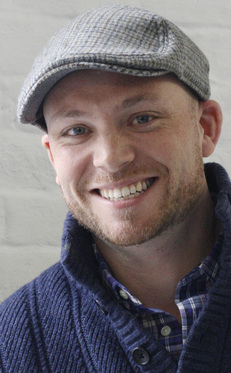 JACQUELINE LAWTON: What was the first play that you ever directed? What did you learn from that experience that remains with you today? SHAWN LACOUNT: The first play that I directed was Tennessee Williams’ “Out Cry” or as it is sometimes known, “The Two Character Play.” I learned the value of starting a theatrical process with great writing and working with people who have generous hearts. I also learned that doing a dark, incestuous, psycho-drama during the holiday season is not nearly as marketable as it sounds. JL: Why did you decide to get into theatre? Was there someone or a particular show that inspired you? SL: I really never intended to get into theatre. Truthfully, I was embarrassed by my interest in it. I broke my ankle trying out for the basketball team one year and my parents told me that I had to do something in school to socialize and keep me from causing trouble. My mother had been an actress and a theatre educator, so it was in the blood. Working on stage felt strangely natural. Throughout my artistic career I still have points when I ask myself if I really need to be doing this, is it the best way to engage and express? JL: What kind of work do you do to pay the bills? How do you balance this work with your work as a director? SL: In addition to being the Artistic Director at Company One, I also own a bed & breakfast. I like making my money outside of the theatre. It means that whatever project I choose to do, it better be worth my time and the time of everyone involved as artist or audience. It also means that I don’t have to take on projects that I don’t think are important. It’s incredibly liberating and I suggest it. I am a multi-tasker at heart, so running two or three businesses at once keeps me alert. JL: Now, I’d love to hear your thoughts about working in Boston. Finish this sentence
JL: How do you feel the Boston theatre community has addressed the issues of race and gender parity? How has this particular issue impacted you and your ability to get your work produced on the main stages? SL: The Boston community feels like it is finally starting to address issues of race in a meaningful way. This is core to Company One’s mission. Stage Source seems to be trying to help us all address the issue as a community. Gender too, in some ways. Some of the most powerful people working in the Boston theatre are women and Boston seems to produce more plays by female playwrights. Bottom line is, if we care about these things we have the power to change them. JL: Tell us about the play you’re working on and what excites you about it. SL: I have the great pleasure of working on Kirsten Greenidge’s new script titled Splendor Lit Beneath Their Bones. In 2010 Company One commissioned 7 writers to write one act plays inspired by one of the Brothers Grimm fairy tales, with a Company One twist. We had wonderful writers and the production was called GRIMM. Kirsten was one of those writers and her play Thanksgiving was inspired by a fairytale called Clever Else. Thanksgiving became the inspiration for Splendor as Kirsten began creating a full length play out of that one act. What is most exciting to me is that Company One has committed to producing Splendor on our mainstage next season, once it has been through the XX PlayLab development process this year. That means we will have spent a good three years developing this play, and that is kind of awesome! It’s also a local story and I am a Boston boy. It is one of the many reasons that I love Kirsten’s work—she writes about people and circumstances I know. JL: Why should audiences attend the XX Playlab Festival? SL: The primary reason people should attend the festival is because of these exceptional playwrights. These writers are not only three of Boston’s best, but they are some of the strongest and most important playwrights in America today. Kirsten, who has been in residence with Company One since we first produced one of her plays in 2005, is an incredible writer who has work being produced across the country at major theaters. Off her recent Broadway run of Stick Fly, people will be able to get the first glimpse of Lydia Diamond’s brand new play Smart People. And Natalia Naman, who may be the newest voice among the three, is continuing to get residencies and commissions around the country as well! Her play The Old Ship of Zion is beautiful, funny and full of song. To hear these plays at this stage, with dynamic playwright discussions and panelists (and all for free!!) is a gift! JL: What advice do you have for up-and-coming directors? SL: My best advice to up-and-coming directors is to direct. If you are one of the lucky ones to be hired and/ or paid to direct, then good for you! For everyone else, you will only truly grow by directing. There is only so far observing, assisting and reading can take you. If you are inspired to make theatre, then you need to find a way to do that. And if you get to direct on your own terms for whatever reason, please think about the work you are putting into the world. Are the stories you are choosing to tell forwarding us as a society, a community, a people? Know your point of view as an artist, it will set you apart from the rest. JL: What's next for you as a director? Where can we keep up with your work? SL: After the XX PlayLab readings in March, I will begin work on the mainstage production of Kirsten Greenidge’s Splendor Lit Beneath Their Bones for Company One in the fall. At Company One in April we have Qui Nguen’s bad-ass play She Kills Monsters, which you do not want to miss! You can check out all of the incredible plays we produce at companyone.org. You can follow the company on facebook or me on twitter, if you are in to that sort of thing.
|
My BlogI'm a playwright, dramaturg, and teaching artist. It is here where you'll find my queries and musings on life, theater and the world. My posts advocate for diversity, inclusion, and equity in the American Theatre and updates on my own work. Please enjoy!
Categories
All
Archives
June 2020
Reading List
|

